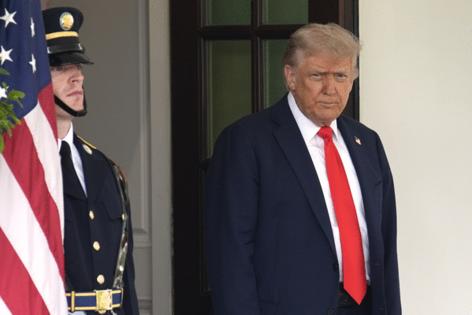Commentary: Bowling alone, voting for Trump -- The collapse that made Trump possible
Published in Political News
As an undergraduate, a wise professor once told me that what happens between elections matters just as much as the elections themselves. It’s in town halls, neighborhood associations, labor unions, PTA meetings, and volunteer drives where the habits of self-government are formed—and where a culture of pluralism, empathy, and shared responsibility is cultivated. That culture has been eroding for decades. Now, into the vacuum steps Donald Trump.
Trump’s rise didn’t happen in a vacuum. His grievance-fueled politics found fertile ground in a country where trust has collapsed, civic institutions have hollowed out, and too many Americans feel unheard, unseen, and unmoored. When people stop showing up for each other, someone like Trump—offering identity without responsibility and loyalty without civic duty—becomes not just possible but inevitable.
What Putnam warned us about
In his 2000 book “Bowling Alone,” political scientist Robert Putnam warned that Americans were disengaging from civic life. Church membership, union participation, club involvement—all were plummeting. We weren’t just bowling alone; we were living alone, voting less, and pulling back from the institutions that once knit society together.
Putnam distinguished between two types of social capital: bonding ties within close-knit groups, and bridging ties that connect across lines of difference. The former builds solidarity. The latter sustains democracy. In recent decades, we’ve preserved the former—and lost too much of the latter.
The numbers don’t lie
The civic infrastructure is in tatters. Since 2000:
— Trust in government has dropped from 60% to under 20% (Pew Research Center, 2023).
— Union membership has fallen below 10%, half of its early 80s rate (Bureau of Labor Statistics, 2024).
— Religious attendance is at historic lows (Gallup, 2023).
— Over 2,500 local newspapers have closed (Northwestern University, 2023).
— Volunteerism and local election turnout continue to decline (AmeriCorps, 2023).
The Washington Post famously warned that “democracy doesn’t die in darkness”—but it also withers in neglect. As Americans retreat from shared civic life, we lose the spaces where we meet across differences, resolve conflict, and practice democracy on the ground.
Enter social media: The digital arsonist
As civic spaces dried up, they were replaced by dopamine machines—social media platforms built not to cultivate community but to monetize attention. Facebook and YouTube promised connection but delivered tribalism. Algorithms reward outrage, not deliberation. Hashtags simulate activism while draining it of any substance.
Instead of talking politics with neighbors, we perform for strangers. Instead of listening, we scroll. The result isn’t community—it’s grievance, curated and affirmed in isolation. This dynamic affects both the right and the left. As Jamelle Bouie noted in the New York Times, the MAGA right thrives on zero-sum thinking: if someone else gains, I must be losing (NYT, 2025).
When civic life breaks, identity politics rush in
Trump offered what traditional civic life no longer could: a clear sense of who’s in, who’s out, and who’s to blame. He didn’t call citizens to a shared purpose. He promised to punish enemies. That wasn’t a glitch—it was the design.
Working-class voters didn’t necessarily love Trump—they believed he was the only one speaking to their concerns. And those concerns weren’t just economic. Many felt elite institutions—universities, media, the culture industry—had turned against them. Trump tapped into that resentment with surgical precision. Democrats, by contrast, often presented a sprawling to-do list without a story.
Trump projected “alpha energy”—what Rep. Elissa Slotkin likens to coach-style leadership: blunt, emotional, and tribal (NYT, 2025). In communities hollowed out by civic decline, where people felt ignored or dismissed, that mattered more than policy. Trump didn’t offer belonging in the traditional sense—he offered its echo, a performance of community rooted in exclusion.
Conclusion: The spectacle replaces the republic
That same professor—Theodore Lowi, the legendary political scientist—once told our class that democracy isn’t just a system. It’s a habit. It has to be practiced. When we stop showing up for each other—at PTA meetings, union halls, council forums—we become easier to divide. We grow more suspicious of neighbors, and more accepting of the strongman who promises to fix everything.
Trumpism didn’t hijack a healthy democracy. It capitalized on one already hollowing out.
To be clear, efforts at civic renewal still exist—community organizing, mutual aid networks, and even a reinvigorated labor movement have pushed back against this erosion. But they remain fragmented and too often isolated from formal political power. The larger trend is unmistakable: the steady collapse of the institutions that once anchored civic life.
If we want to prevent what comes next, we need more than campaign wins. We need to rebuild the civic scaffolding that makes democracy resilient.
Because Trump didn’t rise in a country that cared too much about civic life.
He rose in a country where too many stopped caring—until they no longer recognized what had been lost.
_____
Robert Cropf is a professor of political science at Saint Louis University. Follow him on LinkedIn.
_____
©2025 The Fulcrum. Visit at thefulcrum.us. Distributed by Tribune Content Agency, LLC.

























































Comments